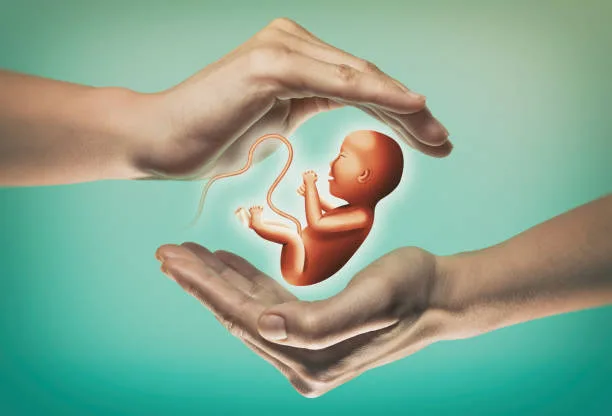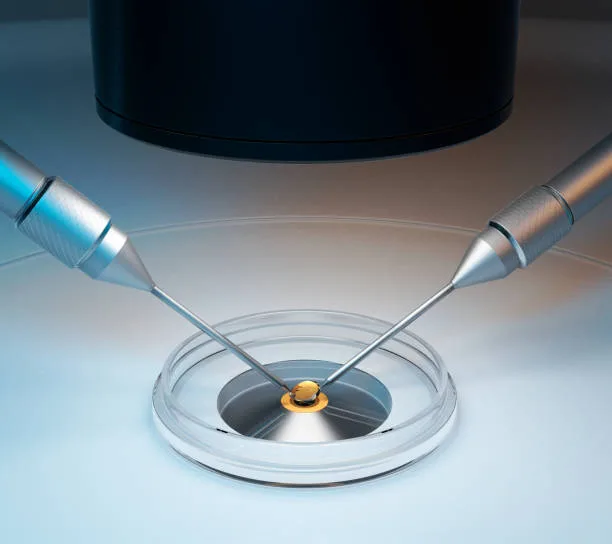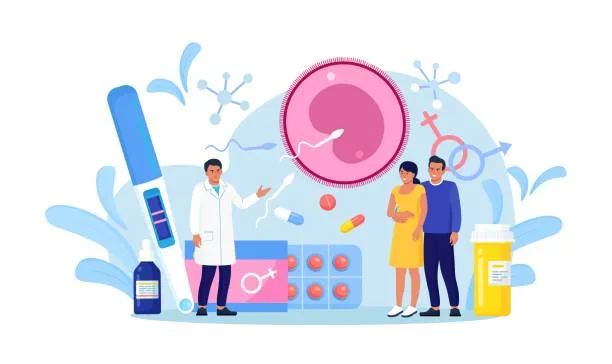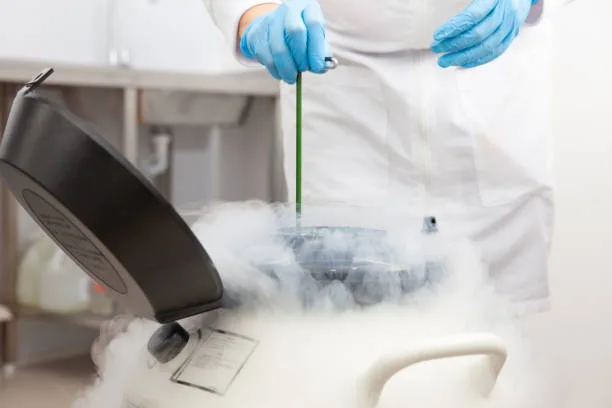Test Tube Baby in Pakistan
Introduction

Dear friends, In recent decades, the field of reproductive medicine has witnessed remarkable advancements, providing new hope and possibilities for couples struggling with infertility.
One such groundbreaking technique is the test tube baby, scientifically known as in vitro fertilization (IVF). This procedure has gained popularity in Pakistan as a viable solution for couples longing to start a family.
In this comprehensive blog, I will try to explore the test tube baby in Pakistan, its process, success rates, challenges, and the hope it brings to countless families.
Let’s start…..
Understanding Test Tube Baby Procedure (IVF)

What is IVF?
In vitro fertilization (IVF) is a medical procedure that involves the fertilization of an egg with sperm outside the human body. The term “test-tube baby” is a colloquial expression that refers to babies conceived through IVF. While the procedure may sound complex, it offers hope to couples facing various fertility challenges.
The IVF Process,

Ovulation Induction:
The process begins with controlled ovarian stimulation, where a woman receives hormone medications to stimulate the ovaries to produce multiple eggs. Monitoring of hormone levels and ultrasound scans is crucial during this phase.
Egg Retrieval:
Once the eggs reach maturity, a minor surgical procedure called egg retrieval is performed. A thin needle is inserted into the ovaries to collect the eggs.
Sperm Collection:
Simultaneously, sperm is collected from the male partner or a sperm donor.
Fertilization:
The collected eggs and sperm are combined in a laboratory dish to facilitate fertilization. This dish is often referred to as the “test tube.”
Embryo Development:
Embryologists monitor the fertilized eggs, now called embryos, as they develop over several days.
Embryo Transfer:
One or more healthy embryos are selected for transfer into the woman’s uterus. This is typically done after 3 to 5 days of embryo development.
Pregnancy Test:
A blood test is performed approximately two weeks after embryo transfer to determine if pregnancy has occurred.
The Success of IVF in Pakistan
my respected friends,
The success of IVF in Pakistan has been remarkable, giving hope to couples struggling with infertility. Several factors contribute to the growing success rates.
The success of IVF varies depending on several factors, including the woman’s age, the cause of infertility, the number and quality of embryos transferred, and the clinic’s expertise. Generally, younger women tend to have higher success rates. According to the Centers for Disease Control and Prevention (CDC), the average live birth success rate per IVF cycle is around:
41-43% for women under 35
33-36% for women aged 35-37
23-27% for women aged 38-40
13-18% for women aged 41-42
6-10% for women aged 43 and older
It’s important to note that these statistics can vary significantly between clinics and countries.
Let’s take a look at some other important things.
Advancements in Technology:
Pakistani fertility clinics are equipped with state-of-the-art technology, allowing for precise monitoring and manipulation of the IVF process.

Expertise of Fertility Specialists:
The country boasts a cadre of highly trained fertility specialists with expertise in reproductive medicine.
Affordability:
IVF procedures in Pakistan are often more affordable than in Western countries, making them accessible to a broader population.
Cultural Acceptance:
As societal attitudes toward infertility treatments evolve, more couples are seeking help without fear of stigmatization.
may you like this https://drreactivate.com/abc-juice-benefits-and-astonishing-health-perks/
Challenges in the IVF Journey
Yes friends, While IVF offers hope to many, it’s essential to acknowledge the challenges and emotional rollercoaster that couples may experience.
The test tube baby procedure has not been without its share of ethical debates and considerations. Some of the key ethical concerns include:

Emotional Stress:
The IVF journey can be emotionally draining due to the uncertainty of outcomes, repeated procedures, and the financial burden.
Multiple Attempts:
Friends, Success may not be achieved on the first attempt, requiring couples to go through multiple cycles of IVF, which can be physically and emotionally demanding.
Multiple Embryo Transfers To increase the chances of success, multiple embryos are often transferred during IVF, which can lead to the birth of twins, triplets, or more. This raises concerns about the health risks to both the mother and the babies, as well as the ethical implications of selective reduction (reducing the number of embryos to ensure a healthy pregnancy).
Egg and Sperm Donation:
The use of donor eggs or sperm raises ethical questions about the identity of the biological parent and the rights of the child to know their genetic heritage.
Ethical and Religious Concerns:
Some couples may face ethical or religious dilemmas related to IVF, as it involves manipulating the natural process of conception.
Health Risks:
Ovarian hyperstimulation syndrome (OHSS) and multiple pregnancies are potential health risks associated with IVF.
Guarantee a healthy pregnancy and baby?
While IVF can significantly increase the chances of pregnancy, it does not guarantee a healthy pregnancy or baby. There are still risks involved, and prenatal care is essential to monitor the pregnancy’s progress and address any potential issues.

Age limits for IVF?
There is no strict age limit for IVF, but the success rates decline with a woman’s age, especially after the age of 35. Healthcare providers may consider a woman’s age and overall health when recommending IVF.
Support and Counseling
Recognizing the emotional toll that IVF can take, many fertility clinics in Pakistan offer counseling services to help couples cope with the stress and anxiety associated with infertility treatments. Support groups and mental health professionals are vital in providing emotional support and guidance throughout the IVF journey.
Legal and Ethical Considerations

In Pakistan, the use of assisted reproductive technologies, including IVF, is governed by legal and ethical considerations. It’s essential for couples to be aware of these regulations, which include.
=Consent:
Both partners must provide informed consent before undergoing IVF treatment.
=Surrogacy:
Surrogacy is not legally recognized in Pakistan.
=Donor Sperm and Eggs:
The use of donor sperm and eggs is subject to regulations and may require legal documentation.
=Embryo Disposition:
Couples must decide on the disposition of unused embryos, such as freezing or donation.
Preimplantation Genetic Diagnosis (PGD): PGD is allowed for medical reasons but is subject to strict regulations.
The Role of Genetic Testing
In some cases, couples may opt for genetic testing as part of the IVF process. Preimplantation genetic testing (PGT) allows for the screening of embryos for genetic disorders or chromosomal abnormalities before they are transferred to the uterus. This can help reduce the risk of passing on genetic diseases to the child and increase the chances of a healthy pregnancy.
may you like this https://drreactivate.com/olive-oil-for-massage-10-benefits/
The Future of IVF in Pakistan

The future of IVF in Pakistan holds promise, with ongoing research and advancements in reproductive medicine. Here are some developments to watch for:
=Advanced Techniques:
Continuous advancements in IVF techniques, such as blastocyst culture, time-lapse imaging, and genetic screening, may further improve success rates.
=Fertility Preservation:
More couples are considering fertility preservation to extend their reproductive timelines, and this option is likely to become more accessible in Pakistan.

=Egg Freezing:
Egg freezing is gaining popularity among women who wish to delay motherhood for various reasons. This technology is expected to expand in Pakistan.
=IVF in Pakistan
Research into male fertility issues and the development of innovative treatments may increase the success of IVF.
Conclusion
The test tube baby procedure, or in vitro fertilization (IVF), has brought new hope to countless couples in Pakistan facing infertility challenges. With advancements in technology, the expertise of fertility specialists, and growing societal acceptance, IVF has become a viable option for those yearning to start a family. While the journey is not without its challenges, the emotional support and legal framework in Pakistan provide a solid foundation for couples embarking on this remarkable path to parenthood. As research and technology continue to evolve, the future of IVF in Pakistan holds even more promise, offering the gift of life to those who have longed for it.
Who can benefit from IVF?
IVF is suitable for couples and individuals facing various fertility challenges, including blocked fallopian tubes, male infertility, unexplained infertility, advanced maternal age, PCOS, endometriosis, and same-sex couples or single parents.
Are there any risks or side effects associated with IVF?
IVF does carry some risks and potential side effects, including multiple pregnancies,
ovarian hyperstimulation syndrome (OHSS), ectopic pregnancy, and a slightly increased risk of birth defects. It’s essential to discuss these risks with your healthcare provider.
How long does the IVF process take?
The IVF process typically spans several weeks, starting with ovarian stimulation and ending with embryo transfer. The entire process, from initial consultations to pregnancy testing, can take approximately 4 to 6 weeks.
Is IVF covered by insurance?
Insurance coverage for IVF varies widely depending on your location, insurance provider, and specific policy. Some plans may cover all or part of the costs, while others may offer no coverage. It’s crucial to check with your insurance provider to understand your coverage.
Can I choose the gender of my baby through IVF?
Gender selection through IVF, also known as preimplantation genetic testing for gender (PGT-G), is possible but typically restricted to medical reasons, such as preventing gender-linked genetic disorders. The ethical and legal aspects of gender selection vary by country and region.
What can I do to increase my chances of IVF success?
To improve your chances of IVF success, maintain a healthy lifestyle, follow your healthcare provider’s instructions, and consider preconception counseling. Reducing stress and seeking emotional support can also have a positive impact.
Are there any alternatives to IVF for infertility treatment?
Yes, there are alternatives to IVF, including intrauterine insemination (IUI), ovulation induction, egg freezing, surrogacy, and the use of donor eggs or sperm. The choice depends on your specific circumstances and preferences.
What happens to unused embryos after IVF?
The fate of unused embryos is a personal decision. Couples can choose to freeze them for future use, donate them to research, donate them to other couples, or discard them. The choice should align with your values and beliefs.
Is IVF a painful procedure?
IVF involves several steps, some of which may cause discomfort but are typically not described as painful. Egg retrieval may involve mild discomfort, but it is usually performed under sedation. The embryo transfer is a relatively painless procedure.
Can I choose the number of embryos to transfer during IVF?
The number of embryos to transfer is a decision made in consultation with your healthcare provider. It depends on your age, the quality of the embryos, and your preferences. Transferring multiple embryos increases the likelihood of twins or higher-order multiples.


very nice